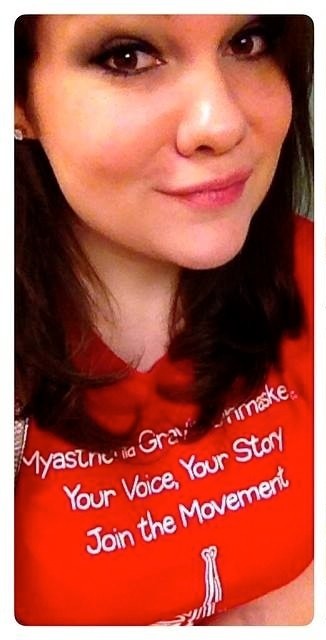Rebekah’s Story: Young Woman Talks About Living with Myasthenia Gravis

June is Myasthenia Gravis (MG) Awareness Month. MG is a neuromuscular autoimmune disease many people do not know about. People with MG are known as “snowflakes” because our symptoms vary greatly. Below, I’d like to share my fellow snowflake, Rebekah Dorr’s, story: how Rebekah got a diagnosis, her symptoms, and her coping strategies.
Jessica Gimeno (me): How old are you?
RD: 26-years old.

JG: When were you diagnosed?
RD: I was diagnosed September 2011–a few weeks shy of my 22nd birthday
JG: What symptoms were you experiencing?
RD: I was at the beach in the beginning of August, notoriously one of the hottest months in Florida, for a week during a family reunion. The last few days I remember complaining that I just didn’t feel right. Something was off but I couldn’t quite by my finger on it. I felt like I was coming down with the flu and yet, other than a general malaise and fatigue, nothing else was notable. By my last day at the beach, after playing hard non-stop in the sun and swimming against the waves for days, I was beginning to have a little trouble with my legs. I began to drop things and I felt clumsy. Ten days went by with little to no improvement, in spite of rest and fluids. I went to the ER and was summarily dismissed with a Tylenol and a pat on the head. By day fourteen I was still not improving. I began to have periods where I was short of breath and my fatigue increased. I was worked up for spinal meningitis via a spinal tap that showed little. The resident on call wished to keep me due to my weakness in the arms and legs yet the attending insisted I was looking for drugs and sent me on my way. I walked out like a duck. It quickly escalated from there into a third and then fourth visit to the ER within a couple of days where they repeated a second spinal tap on me that left me paralyzed for six weeks in my legs. I was again sent home after an eight day stay with no diagnosis. Visiting nurses encouraged me to find another hospital. In the new ER I was diagnosed within a few hours.
I lost my sight along with my speech. The only thing I knew to do was to pray and to let my mouth hang open to stop the need to swallow and hopefully abate choking. My mother held me in her arms, desperately calling out to Jesus to save me.
JG: What’s the worst episode you’ve had?
RD: Oh gosh. This certainly is not pretty and is very hard for me to talk about. I went into a cholinergic crisis after receiving Mestinon via IV since I was unable to keep fluids or medication down during a particular hospital stay. Within seconds of receiving the medication, my whole body was paralyzed. I cried out but could not move. Instantly I began to choke and gasp for air, I could not swallow, my body dripped in sweat yet I was shivering. I lost my sight along with my speech. The only thing I knew to do was to pray and to let my mouth hang open to stop the need to swallow and hopefully abate choking. My mother held me in her arms, desperately calling out to Jesus to save me. I was rushed to ICU where I was monitored for a twenty-four hour period. I will never forget that encounter. It haunts me to this day and lingers in my mind, always on the edge of my consciousness, reminding me of just how far MG can take you.
JG: How is life like now?
RD: My MG is considered stable now post thymectomy (surgery where the thymus is removed; thymus is near the heart). I am still on prednisone but I am slowly weaning off. I battle fatigue, short term memory loss and a long list of other symptoms. I am also fighting against several other diseases. Some days I am able to conquer the world (or at least my small little world) and other days I am lucky to shower and change into fresh pajamas.
JG: What are some of the coping tools you use?
RD: On days I feel so sick and overwhelmed it is all I can do to simply lay in my bed, I spend a great deal of time with my good friends, Hulu and Netflix. Sometimes it is a simple prayer, calling out to God. Faith, family, friends, music, books, my support page and all of the local awareness projects I am plugged into, they all keep me going and grounded. It is so important to find new purpose with MG and all of chronic illness really. I think I would have been swallowed up in despair long ago without these things.
JG: What’s your dream?
RD: I want to change the global, cultural stigma against chronic illness both clinically and in the community. So much of our battle is not just fighting our own bodies but fighting against how people perceive us–who we are and how we should or should not function. It becomes an obstacle to those living with a long-term disease, an inhibitor that impedes them from forming new and healthy identities with the support of family, friends and clinicians.
JG: How do you create MG awareness?
RD: MG Awareness is always happening. It isn’t just in the big campaigns of posters and pictures and walks, (although these are incredible and powerful tools to use!) but in the everyday moments. Talking to new patients, educating patients and caregivers on their disease, how to fight it, how to advocate and why this knowledge is important. To me, awareness happens when it finally clicks for a patient and their disease is no longer this ambiguous creature that controls them. A creature that has a name and the ability to be assuaged. Awareness is more than creating a buzz, it is depicting a ruthless disease in its appropriate light, showcasing how it alters and steals and yet brings beauty and hope amid the ashes. On my page, I seek to combine a wide variety of tools from photo campaigns and hashtags (credit to Sandra Hardin) to custom t-shirt fundraisers.
JG: What would you like people who do not have MG to know about this disease?
MG changes everything. Yet so many of these life-altering changes remain invisible to the naked eye. You cannot see what is happening at my neuromuscular junction but oh can I feel it! Just because I smile and wore some makeup today doesn’t mean I am healed or all better or conversely that I am being dramatic when I say I am sick and yet for all outward appearances, I look well. There is so much shame that comes with chronic illness. Using a wheelchair in your 20’s when you look “ok” is cause for a lot of painful social encounters. When I am too sick to get out of bed, trust that I am not seeking attention or trying to get out of working. I will be happy one minute and struggle against my disease the next as it invariably changes like a roller coaster. MG is not as easy to live with as they claim. Almost every sight you click online from reputable hospitals to national foundations will tell you that MG is easily treated. I digress: MG has treatments and for that we are eternally grateful. But, while many live a fairly normal life, it is not the case for the majority. These treatments come with a price tag and a great deal of “sticker shock.” Be patient with me. Love me as I am, where I am, no matter what.
I want them to know that no matter where they are, who they are or what they are facing in that moment, they are loved, they have purpose and they are not alone. We cannot over-estimate the great power in these truths.
JG: What message do you have for people who live with MG or any chronic illness?
RD: I want them to know that no matter where they are, who they are or what they are facing in that moment, they are loved, they have purpose and they are not alone. We cannot over-estimate the great power in these truths. I spent the first eighteen months wholly unaware of the nuances of MG and what I would be facing. I wish I had someone who had walked that road with me. I never want anyone to go through that. I want them to know that I will be there. I will be there in the middle of the night when they are scared, if they are confused or have questions or just need to vent or laugh or have a hug. I do not have the power to cure MG, nor do I have the power to make it all butter. But I do have the ability to partner with every myasthenic I come across and walk this crazy journey with them. Whoever is reading this: You are not alone.
“Like” Rebekah’s Facebook page, Myasthenia Gravis Unmasked, here.
Follow her on Twitter here: https://twitter.com/RebekahDorr
I laugh at my favorite comedies and revel in the simple joy of a new lipstick. I find new ways to find beauty in myself and in others and I am reminded that I have a purpose, and that alone is very beautiful.
ON BODY IMAGE & STYLE
JG: Has MG changed your appearance?
RD: The inability to exercise often and a combination of four years of steroids has changed everything. My skin, my hair, my weight (big time), my confidence. If I am in a wheelchair, my appearance and acceptance socially changes. When people see me, they assume I am simply over weight or that I am scowling or looking grumpy/tired for no reason. How could they know? I no longer wear heels because it fatigues my legs. I spent too many years hiding in clothes instead of celebrating in them.
JG: How does this make you feel?
RD: I feel like I am a shadow of my former self in many ways. I used to never go a day without makeup. I was always out and about with carefully chosen outfits and beautiful jewelry, my hair and nails done just so. Now I am pleased if I showered, dried my hair and slapped on some earrings and mascara. Some days are easier than others, but it is a constant learning process.
JG: How do you deal with changes?
RD: Silly as it sounds, before bed, I spritz on a light body splash with a favorite fragrance. If all I did that day was get up and brush my teeth, it helps me feel feminine and human. I find outfits that are easy for me and yet look flattering. I revel in the simple joy of a new lipstick. I find new ways to find beauty in myself and in others and I am reminded that I have a purpose, and that alone is very beautiful.
Related: Myasthenia Gravis Online Resources
–Your Stylist, Jessica Gimeno





Rebekah giving you a standing ovation. Your interview says so much of what us as MG’ers want the people to know.
My journey began in 1990. Very few had even heard of Autoimmune, much less Myasthenia Gravis. Once I found a doctor who had treated patients with the disease I became very frightened. I had a disease, one without a cure, I would have to maintain my body the rest of my life if I wanted to Live.
Years of trials with medicines, the thymus being taken from my chest, IVIG, then followed by Plasma Phersis treatments in 2005, I was placed in ICU for several weeks. A blood clot had passed into my brain. Therapy was given to help me to learn to walk and talk all over again.
Today I am still in this battle that some say ‘doesn’t show’. Recovered from the stroke, left with my left arm/hand frozen with neuropathy, I’m still very happy that I lived through it because according to my doctor, they lost me three times.
Yes, no one should have to face their battle alone or be accused of being lazy. If we over do, we pay dearly.
Thank you Rebekah for sharing.
that is a a very touching story almost made me cry -i have followed you on line but never new how tough this is for you,i will always pray for you Rebekah! You are truly a beautiful person,thank you for letting us into a little bit of your life!
Rebekah, God has a purpose for you young lady. Your story(your life) inspires others. Those with illnesses and those without, myself included. You’re a fighter. I don’t think I’ve met a stronger, braver person than you. Keep bringing the message! May God Bless you and your wonderful family.
What a beautiful person, inside and out. Thank you for so openly sharing how life is for you. Truly inspiring x
I was diagnosed with Myasthenia Gravis in 2014, 2 years after they removed a tumor on my thymus. It’s been an okay road. Had one flare which put me in the hospital 4 years ago and this previous year I have been in and out of the hospital trying to see which treatment can get me back feeling 100% again. Pyridostigmine bromide just makes me nauseous all day and didn’t help my droopy eye or swallowing so I need to try something else which was natural herbs recommendation from multivitamincare. org This herbal treatment has successfully cure my MG and am 100% free ,I completed the herbal treatment program last year December and am very delighted i came across their website.it starts in the eyes and face then bulgar muscles , without treatment or the proper dosages of treatment it goes on to my limbs and then neck and breathing muscles but I can happily say that am free from MG after taking my chances to try natural herbs ,my neurologist was surprise after my result of being totally cured with herbal cure from the org.
Hi Rebekah, I’m a fellow MG’er – childhood onset age 8. It went undiagnosed until I was 19, have lived with it for many years now – thank you for sharing your story, it meant alot to me!
Thanks, Anne, for sharing! Living with MG is hard; I got it at 24. I can’t imagine getting it as a child. I will share your kind comments with Rebekah.
Blessings to you, Jessica
My sister was diagnosed with MG, after trying so many treatments with no hope we came across a website called docspert health and I need to say that this was one of the best things we experienced during this journey. they have a very professional team and international experts and they really helped us very much.